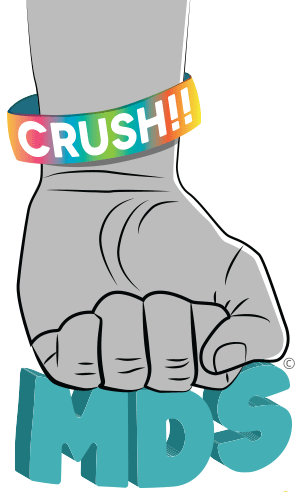Six Top Medical Institutions Launch Research Alliance Program to ‘CRUSH MDS’, a Rare Form of Blood Cancer
Joint Effort Expands Experts' Capacity to Develop Treatments, Find a Cure
Ex-marine Kevin Chambers had always been a strong and powerfully built man. The retired 66-year-old Vietnam War veteran used to work as a professional bodyguard in New York City, providing personal security for major celebrities like Michael Jackson, James Cagney and Barbra Streisand. Last year, Chambers needed a wheelchair and a walker just to get around.
“I got sick in 2014 and felt so strange and weak in so many ways,” said Chambers. After being initially diagnosed with severe anemia along with two other conditions, later test results showed he had atypical myelodysplastic syndrome (MDS), a life-threatening bone marrow failure disease. Thanks to his daughter, an editor at ABC’s Good Morning America, Chambers was referred to Dr. Gail Roboz, the specialist who treated the show’s co-anchor Robin Roberts for MDS.
Roboz is with the Weill Medical College of Cornell University, one of the six preeminent institutions that form the MDS Clinical Research Consortium (MDS CRC). The others include the Cleveland Clinic Taussig Cancer Institute, the Dana-Farber Cancer Center in Boston, MD Anderson Cancer Center in Houston, H. Lee Moffitt Cancer Center and Research Institute in Tampa, and the Sidney Kimmel Comprehensive Cancer Center at Johns Hopkins in Baltimore.
The MDS CRC was created with a grant from the Edward P. Evans Foundation. Suffering from MDS himself, philanthropist Evans was determined to speed up drug development by minimizing excessive “red tape” in clinical research. The CRC is the first collaboration of its kind, and its investigators lead unique, high-quality clinical and laboratory studies aimed at improving the lives of MDS patients. It recently launched a website with a public initiative called the Clinical Repository to Understand, Study and Heal Myelodysplastic Syndromes, otherwise known as CRUSH!!MDS.
The consortium works to accelerate and amplify the research conducted at these leading cancer centers. The beneficiaries are patients like Kevin Chambers, who Dr. Roboz quickly involved in a clinical trial. With careful monitoring of his blood cell counts and reactions to drugs, she was able to customize his care with precision treatments that were regularly adjusted based on his progress.
One year later, Chambers is walking again and his strength has vastly improved. He used to need a blood transfusion every two weeks. Now his transfusions are five weeks apart. He jokes that when he has enough blood, he doesn’t even need to nap. “I work very closely with Dr. Roboz and, if I don’t follow what she says, she kind of gives me hell by thanking me for my medical opinion.” That toughness combined with constant attention to the clinical data is how the specialists CRUSH MDS.
Press release originally posted on AAMDS March 2, 2016


